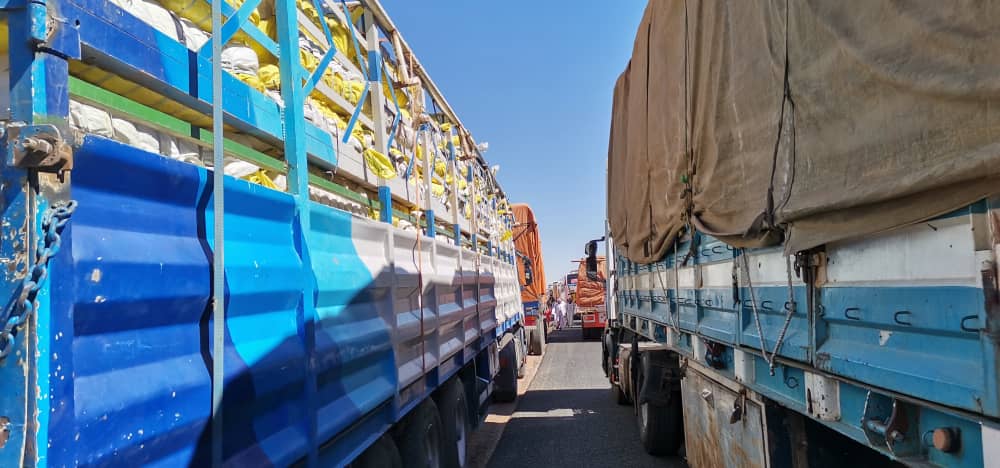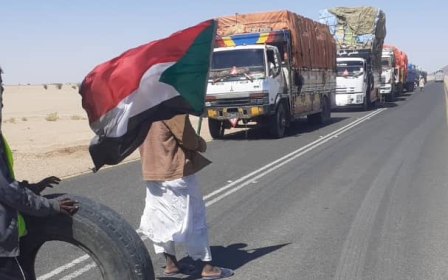Sudan and Egypt plan big trade increase as impact of barricades hits home

The barricading of haulage routes by protesters along the Sudan-Egypt border is having a real impact on the economy of both countries, with livestock exporters admitting that they have lost nearly $1m per day since the closure of roads in mid-January.
The disruptions come as official Sudanese investment corporation figures obtained by Middle East Eye show that trade between Egypt and Sudan has been rapidly increasing since 2018, while Egyptian exports have increased substantially following the uprising that ousted Islamist president Omar al-Bashir in 2019.
Documentation seen by MEE showed that the two countries are planning to increase bilateral trade to $8bn, with more than 200 investment projects planned in everything from the services industry to manufacturing and agriculture.
Since January, the protest movement Barricades of the North, which opposes the 25 October military coup led by General Abdel Fattah al-Burhan and the support Sudan’s military leaders are receiving from Cairo, has been disrupting the transportation of goods - particularly agricultural products and livestock – along the roads connecting Sudan to its North African neighbour Egypt.
The protesters blockading the roads believe Egypt is exploiting Sudan’s raw materials and that the Sudanese people are getting little to nothing in return. Sudan, they also say, has become a captive market for Egyptian services, manufactured materials, chemicals and petrochemicals.
New MEE newsletter: Jerusalem Dispatch
Sign up to get the latest insights and analysis on Israel-Palestine, alongside Turkey Unpacked and other MEE newsletters
Rising costs
International economic sanctions have been lifted, but banking restrictions on Sudan remain. Sudanese exports dropped 85 percent to just $43m last month from a year earlier, according to government trade data seen by MEE and confirmed by an official from the Sudanese finance ministry.
Exporters and importers have bemoaned the deep impact blockades on ports and roads have had on their businesses, saying that they have lost millions of dollars since September 2021.
Livestock exporters to Egypt, who say they are losing almost £1m every day, have asked the military-led government, which is opposed by the protesters, to intervene and solve the crisis.
Hamid Mohamed, a livestock exporter to Egypt, told MEE that “in addition to the losses because of the stop of exports through northern Sudan, I also need to pay more for the daily expenses of the stranded livestock shipments on the road, like feeding the animals, providing water, payment of the shepherds and other expenditure.”
Agricultural products exporter Suleiman Mohamed said the measures taken by the central bank and finance ministry, which have increased exportation fees by 400 percent, have left exporters suffering. He called on the authorities to change their stance.
“The hiking of prices has raised running, production and transportation costs, so all these factors have already decreased the profit as well as our competitive capacity, but we could somehow deal with that until last year. The most painful losses are because of the closure of roads,” he told MEE.
Meanwhile, former head of the livestock exporters Khalid Wafi, told MEE that export policies in Sudan were encouraging the smuggling of goods, particularly livestock.
“The exporters didn’t bring the exports revenues they got to the country and because of that Sudan is losing around $1.5 bn annually. The strange thing in Sudan is that the government is opening the door to smuggling, while the citizens [protesters] are tracking the smugglers,” he said.
Sudan’s central bank decided last week to freeze around 208 bank accounts of export companies, as punishment for not paying export revenues.
Business leaving Port Sudan
It is not just roads that are being blockaded by anti-military protesters.
Mohamed Abas, head of the oilseed exporters association, said the impact of the ports closure last September by eastern Sudanese tribal protesters was ongoing, and that operations have not been restored. As a result, Egyptian ports on the Red Sea have replaced Port Sudan, the country’s largest port, as a destination for goods.
“The reputation of Port Sudan has been badly impacted because of the delayed operations. The blockade of Port Sudan last year opened the door for the small Egyptian ports on the Red Sea to replace it. Intensive trade began on the roads to transport the exports and imports, but this is also impacted now,” Abas told MEE.
The cost of shipping, as well as that of renting space inside the port, container storage and other technicalities, has increased, Abas said, prompting many shipping companies to leave Port Sudan.
Gasim Siddiq, who imports goods from Egypt to Sudan, said the problems at Port Sudan had led some importers to begin using the Red Sea port of Jeddah, in Saudi Arabia.
“The Sudanese importers started using the Saudi port of Jeddah, then using the small ships (feeders) to transport the goods to Sudan and avoid the delay, increase of ground fees, taxes and other expenses in Port Sudan,” he said.
Flourishing trade
The trade documents obtained by MEE also show a flourishing of imports and exports between Egypt and Sudan since 2019.
This is mainly in Sudanese livestock and agricultural products like sesame, cotton and peanuts. Egypt exports manufactured materials, services, chemicals, pesticides, machines and equipment to Sudan.
According to the figures, exports from Egypt to Sudan increased from $418m in 2018 to $496m in 2019, $525m in 2020 and around $420m in only the first six months of 2021.
While Sudanese exports to Egypt in 2018 were $469m, they dropped to $366m in 2019 and to $364m in 2020. In the first half of 2021, though, they have already registered around $300m.
The figures also showed that Sudan has exported livestock worth nearly $150m in the period from January to June last year.
Sudan exported more than 600,000 tonnes of oilseeds to Egypt in the first half of 2021, pocketing around $50m. Sudan has earned $20m in the same period from exports of cotton to Egypt.
In the first half of 2021, Egypt’s main exports to Sudan were in chemicals ($75m), food items ($62m) and machines and equipment ($40m).
Egypt is also expanding the export of electricity to Sudan, according to a previous plan that was implemented in April 2020.
Losses on two sides
Despite the promising trade figures from 2020 and 2021, Sudanese transport ministry official Hisham Abu Zaid has underestimated the impact of the road blockade between Egypt and Sudan, while Egyptian trade consul Tariq Gashoa said that the media had exaggerated the issue.
Sudanese economist Mohamed Aljak said that, in fact, trade between the two countries had been badly impacted by the blockade of the roads, adding that it will hit markets on both sides of the border.
Aljak believes the balance of trade between the two countries is heavily in Egypt’s favour, with Sudanese raw materials being reprocessed and then re-exported to international markets at a much higher price.
While trade flourished after the lifting of sanctions, political opposition to the military coup, which is driving the road closures, has since hurt both sides.
“The blockade of roads and ports has impacted the economy of the two countries, including the businessmen, governments and ordinary people," Aljak said.
"The impact also extends to the international markets, which use the processed Sudanese raw material, in addition to the increase of prices in Sudan due to the lack of raw material flow and the need for Egyptian manufactured items and services.”
Middle East Eye delivers independent and unrivalled coverage and analysis of the Middle East, North Africa and beyond. To learn more about republishing this content and the associated fees, please fill out this form. More about MEE can be found here.







